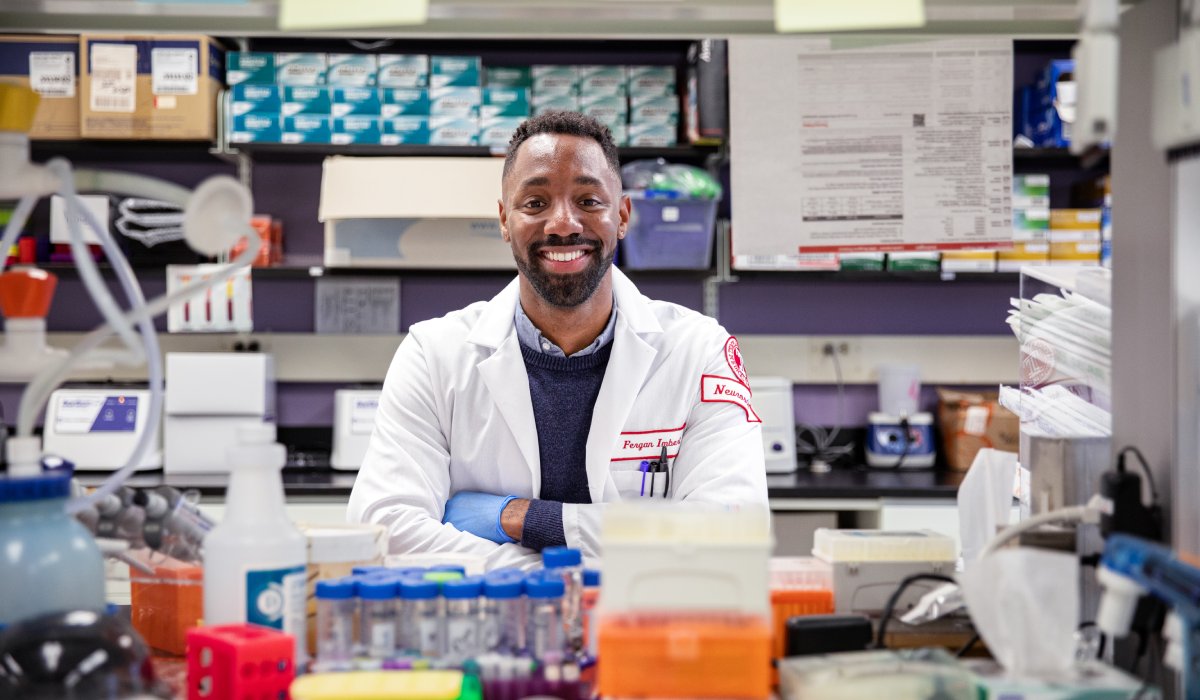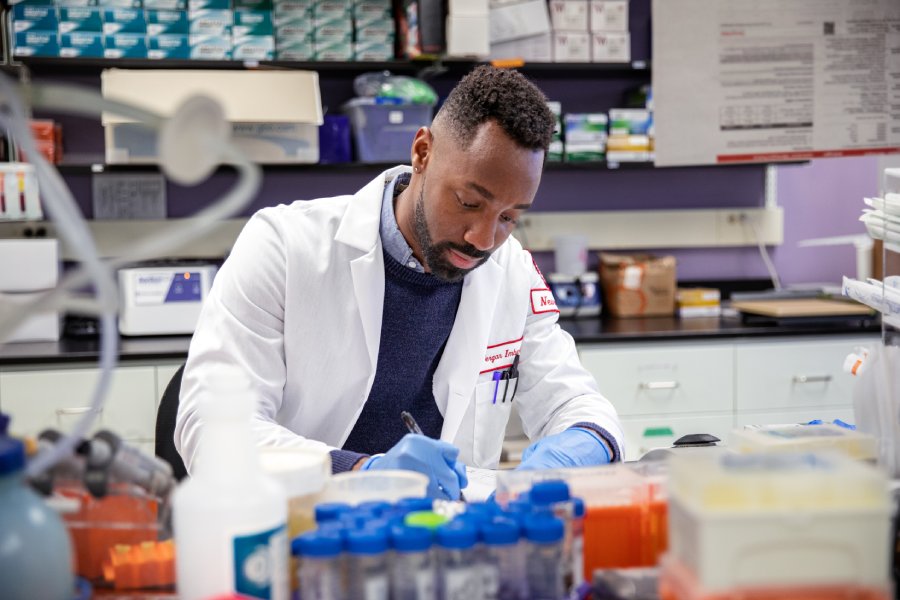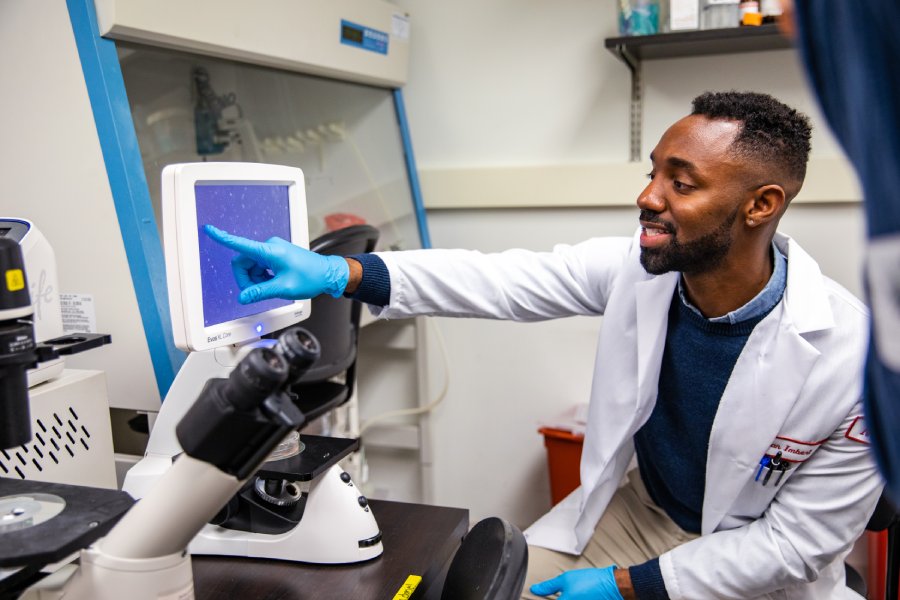
Opening his notebook, Fergan Imbert ’16 settles in at his laboratory bench at the Lewis Katz School of Medicine at Temple University in Philadelphia. As he applies pen to paper, the crisp pages fill with line after line of script, documenting the details of his day’s work.
Imbert, a fourth-year Ph.D. candidate in the Infectious Disease and Immunity cluster in the Biomedical Sciences program, is studying the protein-bonding process SUMOylation in productive and latent human immunodeficiency virus (HIV) infection in the brain, specifically within a cell type called microglia. Imbert’s research investigates the interplay between viruses and the host SUMOylation system and the effects viruses with neuroinvasive properties have on the body’s central nervous system.
In an era where global health threats continue to dominate news headlines, Imbert’s research could have significant implications for the future of public health—consequential work that began with his Gettysburg College education.

“I did an overnight stay at Gettysburg with my high school after I applied,” said Imbert, recalling his first introduction to the College. “I spent Friday going to classes and seeing what it would be like to be a student there. I remember waking up on Saturday morning in Stevens Hall and looking out at the campus and saying, ‘I think this is where I belong.’ I hadn’t even been accepted yet, but I just knew that if I was, Gettysburg was where I was going to go.”
When the acceptance letter came in the mail, Imbert knew attending an out-of-state college would be a first for his family. His two sisters—Imbert is a triplet—chose to attend John Jay College of Criminal Justice and York College near his family’s home in New York City. After visiting Gettysburg College with his parents, Maura and Bergson Imbert P’16, for Get Acquainted Day in 2012, he knew Gettysburg was the college where he could receive the education to prepare him for life after graduation amid a supportive, welcoming campus community.
As a biology major with a pre-health professions concentration, Imbert discovered how the College’s rigorous liberal arts and sciences education challenged him academically.
“I knew what I wanted to do, but I enjoyed learning about new things in sociology, psychology, and history,” he said. “I was introduced to a paleobiology class where we literally went out digging for fossils. If I had gone to a different institution, that class probably would not have been offered.”
Small class sizes and high-impact experiential learning allowed him to further connect with engaging faculty members, such as Jennifer Collins Bloomquist, associate provost for faculty development and dean of social sciences and interdisciplinary programs.
“I took Dr. Bloomquist’s Africana studies class, and it was one of the best courses I’ve ever taken,” he said. “I was able to connect with her on not only the topics we discussed in the course, but on a more personal level about the Black experience at Gettysburg.”
Biology Prof. J. Matthew Kittelberger, who served as Imbert’s academic advisor, also provided Imbert the support he needed at a critical moment in his Gettysburg career.
“After my first year at Gettysburg, I didn’t perform as well in my science courses as I would have liked. I wasn’t as prepared for the rigor of biology at Gettysburg and considered switching my major,” he recalled. “Following a candid conversation with Dr. Kittelberger, I decided to stay with the major, and I’m so glad I did. His guidance was crucial in me staying with the biology major at Gettysburg and my success moving forward.”
As a student in the health sciences, Imbert recalled frequently delivering presentations in almost every class he had. He credits the communication skills he developed at Gettysburg for helping him share his work with members of the medical research community, in which communication is integral. Individuals need to be able to express their research, sharing the results not only in scholarly articles submitted for peer review and publication in scientific journals, but also in terms that the general public can understand.
“When I’m presenting at different conferences representing the Lewis Katz School of Medicine, I’m able to discuss the research that I’m doing in a much more comfortable manner,” he said.

Imbert often reflects on the connections that he made through the Center for Career Engagement and the Gettysburg Network. While he arrived at Gettysburg intending to practice medicine after medical school, a summer internship with Dr. Carolyn Salafia P’16 at Brooklyn Medical Hospital introduced Imbert to medical research, specifically autism research, which ultimately inspired him to join the medical research community.
In pursuit of a career as a medical researcher, Imbert studied abroad in 2014 at the University of Lancaster in England, where he later returned to complete a master’s degree in biomedicine in 2017. A year later, Imbert obtained a research technologist position with the Johns Hopkins Bloomberg School of Public Health.
“My PI (principal investigator) at Johns Hopkins told me that part of the reason he even looked at my resume was that he saw the name Gettysburg College and said there were previous research technologists who were from Gettysburg, and he spoke of how well they succeeded in these positions,” he said. “The director of admissions for my Ph.D. program said to me during my interview that because he saw Gettysburg College on my resume, he had the confidence in what a Gettysburg student was able to do. He knew that there is greatness associated with Gettysburg.”
“The director of admissions for my Ph.D. program said to me during my interview that because he saw Gettysburg College on my resume, he had the confidence in what a Gettysburg student was able to do. He knew that there is greatness associated with Gettysburg.”
— Fergan Imbert ’16
As he looks toward completing his Ph.D., Imbert acknowledges the breadth and depth of knowledge and enduring skills he’s carried with him from Gettysburg College throughout his personal and professional endeavors. As new technologies and innovations contribute to continual changes in science and health, Imbert appreciates how the medical research industry requires leaders who can respond effectively and thrive amid these conditions.
“My time at Gettysburg allowed me to develop the intellectual and practical skills that are transferable for a job in the medical research industry,” he said. “The greatest part about Gettysburg College is that it literally never leaves you.”
By Michael Vyskocil
Video and photos by Abbey Frisco
Posted: 03/15/23